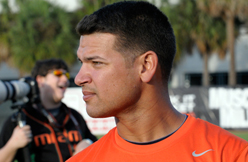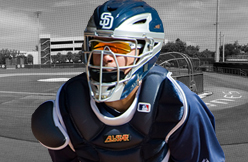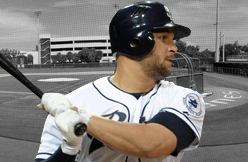Eddy Rodriguez does not forget details. He remembers the color of the sea (black) and the size of the swells (20 feet) when he almost perished 19 years and 10 months ago at age 7. He remembers his mother cracking open her head on a storm-tossed fishing boat, his father cleaning up the blood, the family gathering to pray in front of a porcelain saint, La Virgen de la Caridad, The Virgin of Charity.
On the second evening of a journey from Cuba to the U.S. on the Florida Straits, Eddy remembers these words from his father, Edilio: "If we're going to die, we're going to die together."
Eddy's memory might be his greatest gift as a catcher. Without the aid of detailed scouting reports available to major leaguers, Eddy's ability to capture and store hundreds of distinct visuals makes him a minor league jewel. Before his call-up to the San Diego Padres' Triple-A team in Tucson in early July, he distinguished himself in Double-A San Antonio for his ability to recall the pitch each opposing batter struggled to hit against each of his pitchers. He remembered, for example, how each batter made an out the last time he faced a Missions pitcher: ground ball to third, fly ball to center, strike out on a 3-2 breaking ball, away.
"Eddy has all that information stored in his head," says San Antonio Missions manager Rich Dauer, a former infielder with the Baltimore Orioles. "He makes it so pitchers don't have to rely on themselves to get hitters out. He is a student of the game."
Earlier this season, an Arkansas Traveler approached the plate. Runners on second and third. Two outs. Top of the fourth. Keyvius Sampson, a top right-handed prospect, on the mound. Eddy remembered the left-handed batter, Anthony Bemboom, could not hit Sampson's best pitch. So Eddy called for a changeup. Bemboom grounded out to first, Sampson escaped the jam and came away with the victory.
Everyday in the minors is a reminder of the eight days Rodriguez spent last season with the San Diego Padres. A reminder of his first big league at-bat against the team that drafted him: a 2-1 slider from Cincinnati's Johnny Cueto, the ball exploding off his bat, a 416-foot shot over the left-center wall in Great American Ball Park. Two days earlier, Rodriguez was hitting .223 in Class A Lake Elsinore.
What are the odds? It took injuries to two catchers to create an opening in San Diego. It took management to look beyond Rodriguez's advanced age (26) and weak bat (a career .239 average in minor and independent leagues). It took Rodriguez's play-calling and defense to get the promotion over more highly rated prospects.
If he can return to the bigs at age 27, and Dauer believes he will, Rodriguez will underscore the rarity of his journey. Among the 52 Cubans who have defected and played in the Majors (per baseball-reference.com), Eddy may be the only one who cried and begged to go back home.
*****
Edilio and Ylya Rodriguez raised a son and daughter on a farm in rural Cuba. The family lived comfortably off their land and animals: chickens, pigs, lambs. They drank milk from their own cows. They had electricity, running water, a blue Chevy, circa 1956. The farm in Villa Clara stretched as far as young Eddy could see. "I probably didn't set foot on all the land we had," he says.
Edilio often went spearfishing and freediving off the Cuban coast. About once a month, he took the family to a favorite spot, ostensibly, to fish and cook and enjoy the beach. Unknown to Eddy: On each trip to the key, Edilio brought a tank of fuel and buried it in the sand. His plan was to collect enough fuel for a three-day journey to Florida on his 21-foot fishing boat.
On the day of departure, Eddy thought he was going, at last, to a coveted fishing hole. "Every time my dad would go to this one place, he would come back with all these fish," Eddy says. "I would beg him, 'I want to go! I want to go!' But he would always tell me I was too young, it was too dangerous."
The boat left the island at dusk. On board were Edilio and Ylya, Eddy, his sister Yanisbet and a cousin, Carlos. Eddy remembers the sky growing dark. He remembers the excitement giving way to an ominous feeling the next day. The boat had gone out too far. Fatigue settled in. Eddy wanted to go home.
"We're not going back," Edilio said. "We're going to the United States."
Fear and panic gripped the boy. "I want to go back," he cried. "I want to see my abuelita!"
Edilio sailed on through tearful pleas for Eddy's grandmother. Evening descended. A gathering storm approached. Thunder. Wind. Rain. Ylya fell on the rocking boat and struck her forehead on a bench. Edilio ripped a piece of his clothing and applied pressure to the bleeding wound. Then he gathered the family. The Virgin of Charity and other saints were placed on a wooden box in front of the Rodriguezes. "We were praying to God, praying to the Saints, 'Just get us out,'" Eddy says.
The sea turned black. Twenty-foot waves hammered the boat. It nearly capsized. Edilio and Ylya grabbed buckets and threw water back out. The boat, meanwhile, rose high in the swells, only to get thrown back down. "We weren't gaining any ground and we were burning fuel," Eddy says. "So my dad turned the engine off and we just started drifting."
Ylya and Carlos leaned over the vessel and retched. Eddy remembers the color: green. Neither Eddy nor Yanisbet grew seasick because, earlier, Ylva had given them pills, evidently the last two. Nausea did not overwhelm brother and sister. Terror did. And then, to the astonishment of everyone, the storm seemed to divide. Eddy recalls heavy rain and fierce winds on either side of the boat. Virtually no storm down the middle.
"I've had people say that's probably b.s.," Eddy says. "But I don't really care how many people doubt it. I went through it."
Yanisbet, Eddy's older sister by three years: "It was a miracle."
Key West sits 90 miles from Cuba's coastline. The waters are treacherous. A large but unknown number of Cubans have drowned attempting to cross over. Some have succumbed to sharks. Others have been captured by Cuban authorities on the sea and imprisoned, or in some cases, slain.
The death of a 15-year-old Cuban rafter at sea inspired volunteer pilots from the U.S. and other countries to assist rafters. In 1991, Brothers to the Rescue was born. Early on, they spotted hundreds of boaters and alerted the U.S. Coast Guard for rescue efforts.
The Brothers did not spot Eddy's family. Edilio believes the storm kept them grounded. After surviving a monster storm, the Rodriguezes faced another grim reality: No food. Little fuel. A broken compass. Edilio used the stars and sun to navigate.
On the third day, Aug. 31, 1993, Edilio raised a white flag, hoping to attract the attention of a plane or a vessel, though he saw nothing but endless water and sky. As the sun rose, a freighter appeared in the distance. Another prayer answered. "I can still see that boat," Eddy says.
Before notifying the Coast Guard, the rescuers provided the family a feast: scrambled eggs, bread, apples, bananas, cafe' con leche and water. It was then, Yanisbet recalls, that Eddy had a change of heart. "All of a sudden, after three days at sea, he says, 'I don't wanna go back. I wanna stay!' And we all started laughing."
Edilio wept when his feet touched U.S. soil. Eddy did not understand the tears. But he quickly learned the pain that comes with freedom. At school in Miami, some kids called him "rafter." The first time he played organized baseball, a popup hit him in the face. When Eddy said he wanted to play catcher, the coach obliged with a punishing drill.
Eight-year-old Eddy stood against a chain link fence, his catcher gear on. The coach stood 50 feet away with an aluminum bat. Eddy was supposed to block balls smashed at him. The kid took a beating. "I was getting hit and bruised so bad tears were coming down," Eddy says. "My mom was crying, saying, 'Hey, what are you doing to my kid?' But I have to thank that guy for breaking me in the way he did. Because after that, I never had an issue with being scared of the ball."
Through the pain, the kid dared to dream. On one visit to Mark Light Stadium in Coral Gables, home of the University of Miami baseball team, Eddy and his mother climbed to a balcony. "Mom," little Eddy promised, gazing across the field, "I'm going to play here one day."
Seven years later, a piece of mail addressed to Eddy arrived. Enclosed was a questionnaire and a note from a University of Miami coach. "We view you as a potential recruit. ..." it began. Eddy broke down. "How crazy is it," he says, "that something I said as a little 8-year-old would become a reality?"
*****
The Cincinnati Reds drafted Rodriguez out of Miami in the 20th round of the 2006 draft. He hit .201 for Class A Sarasota in 2008. The Reds released him the following spring. Eddy landed in the independent leagues and drifted among rejects, longshots, has-beens. After two years, he pondered retirement. And then, out of nowhere, search and rescue appeared.
The Padres offered Rodriguez a second chance. He played for three minor league clubs in 2011, hitting .246, and started 2012 at Class A California League affiliate Lake Elsinore. He struggled at the plate, but impressed behind it, a 6-foot, 205-pound defensive rock. Still, at 26, he remained an impossible distance from the bigs. But then came the impossible call.
Eddy, you're going to the majors.
He could not speak. He could not comprehend the leap. But the timing and context were providentially perfect. In the third year after his release from the Reds, like his third day on the water, a lifeboat arrived. Fittingly, Rodriguez left a team called, "The Storm," for a big league club with two Cubans: first baseman Yonder Alonso, Eddy's best friend since high school, and Yasmani Grandal, the starting catcher whose pulled oblique muscle made the jump to San Diego possible.
No one could have scripted the next twist: Rodriguez first big league at-bat against the team that drafted and released him. On the mound stood a former teammate in the Reds system, rising star Johnny Cueto. At the plate, stood a rookie with a notoriously weak bat. The 2-1 pitch. The swing. Gone. Rodriguez says he blacked out before the ball touched down.
Alonso greeted him with a bear hug in the dugout, two Cubans with a bond and history no one could make up. They grew up 10 minutes apart in South Florida. They played together in Miami youth leagues, together at Coral Gables High and at the University of Miami. Drafted two years apart by the Reds, they reunited in Cincinnati and celebrated as San Diego teammates.
"After he hit the homer, I didn't know if it was a dream or not," Alonso says. "We were all in shock. He worked so hard to get there. It was like a movie script."
Alonso came to the U.S. on a plane with his father. He was 10. Marlins pitcher Jose Fernandez fled Cuba on a speedboat with his mother and sister at 15. Tampa Bay shortstop Yunel Escobar arrived on a raft with 35 defectors. He was 21. Every Cuban ballplayer has a story but none quite like Eddy Rodriguez. He didn't want to come. He homered in his first big league at-bat. He remembers faces but not names. He remembers visuals but not always words. "When I see something," he says. "I don't forget it."
Pat Murphy understands. Murphy has coached Rodriguez for less than a month in Triple-A Tucson and recognizes the obvious. The photographic memory is a tool that keeps Rodriguez in the game. "Eddy is a survivor," Murphy says. "He's not blessed with all the physical talent. So he realizes he needs to survive.
And part of surviving is storing up all that information in your mind. His thinking is, 'I've got to have this part of the game down. I've got to understand hitters, how to get them out. That's gotta be my forte.'"
It's been almost one year since that trot around the bases. Eight days with the Padres left Rodriguez with a meager offensive stat line: One hit in five at-bats, a .200 average. He hit. 240 in San Antonio, hit two RBI singles in his first two games in Tucson, plays strong defense and refuses to give up on a return to San Diego. "I'm 1,000 percent confident I'll make it back," he says.
Dauer believes Rodriguez's glove and arm will create another opening. "He can play at the big league level on his catching ability alone," Dauer says.
Edilio does not fish anymore. He does not go near the water. Eddy cannot stay away from it. The ocean breeze. The salt in the air. The tranquility of angling. The sea is a powerful intoxicant, pulling Eddy out, into the deep, where water and sky stretch far and wide into something sacred: a sanctuary of freedom.
His two greatest loves are fishing and baseball. On a perfect day, he does both. Hours before San Diego called, Rodriguez was fishing on a lake in California. Good things happen to him on the water. Good things happen behind the plate. Rodriguez caught a shutout in his second start in San Diego. He got the game ball. He remembers every detail.

(cnnsi.com)











